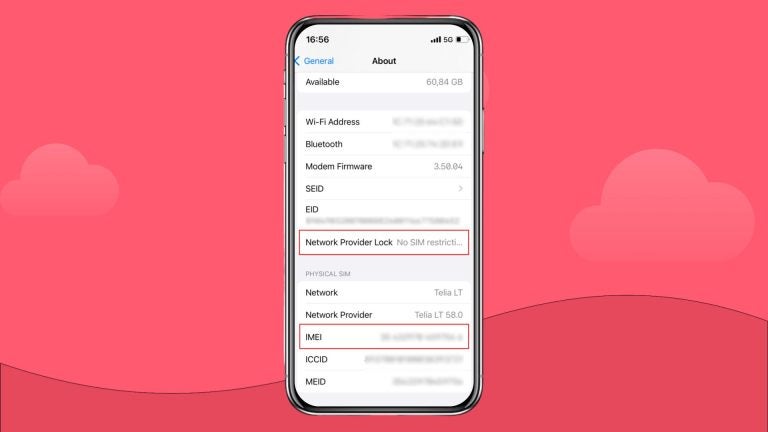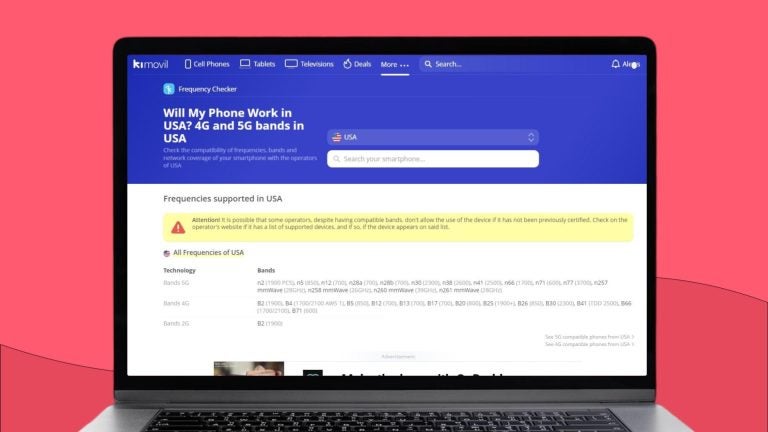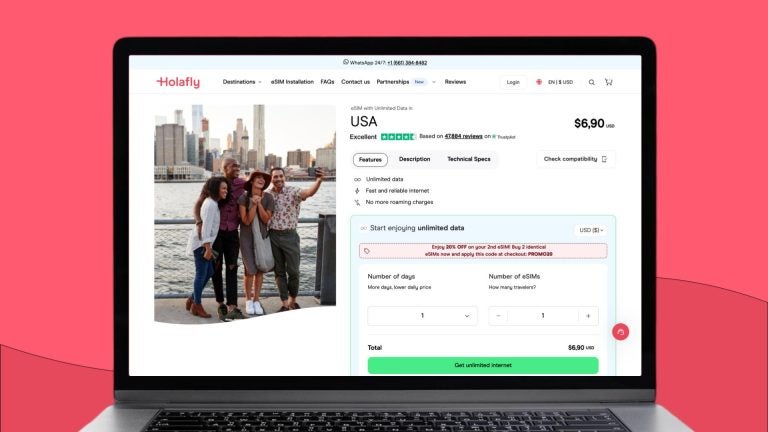Will my phone work in the USA?
Find out if your phone will work in the USA by checking frequency bands, unlocking your device, and exploring options like eSIMs to stay connected.
Yes, your phone will work in the USA. In fact, most modern phones work wherever you go. You can make calls, send texts, and use data while traveling without having to worry about whether or not you’ll be able to stay connected.
In this article, we’ll explain which phones are compatible with US networks, what frequency bands are, and why they matter. We will also explore the top ways to get data, including unlimited data eSIMs from Holafly.
Do international phones work in the USA?
Phones from most major carriers worldwide, especially the newer models, will likely work in the USA. The most important thing to check is whether the phone’s frequency bands are compatible with the ones in the USA.
Here is the table that shows which phones from different networks and countries work in the USA:
| Country | Major carriers | Do phones work in the USA? |
|---|---|---|
| Australia | Telstra, Optus, Vodafone Australia | Yes |
| Canada | Rogers, Bell, Telus | Yes |
| India | Airtel, Jio, Vodafone Idea | Yes, but check the bands. |
| Ireland | Eir, Vodafone, Three | Yes |
| Singapore | Circles.Life, StarHub, Singtel, M1 | Yes, but check bands. Some older models may not support 4G/5G bands. |
| UK | Vodafone, Three, EE, O2 | Yes |
Even though most phones from Europe, Asia, Africa, and the Americas will work in the USA, it is always a good idea to check your specific phone model before traveling to avoid unexpected connectivity issues.
How do I know if my phone will work in the US?
Before you make your trip to the US, make sure your phone will work with the local networks. There are two main things you need to look out for:
- If your phone is unlocked for international use.
- If your phone supports the same frequency bands as the US carriers.
Let’s start by explaining how to check if your phone has been unlocked in the first place.
Ensure your phone is unlocked for the USA
Here’s how to check if your phone is unlocked.
- Check your Settings. Sometimes, you can check your phone status in your phone settings. On iPhone, you can find this information in the Carrier Lock section. Go to Settings > General > About, and if the Carrier Lock settings show No SIM restrictions, your phone is unlocked.
- Try a different SIM card. Try putting a different SIM card in your phone. If you get a message saying your SIM is not supported or a request to enter a SIM unlock code, it means your phone is locked. If the new SIM works seamlessly, you are all set.
- Contact your carrier. The fastest way is to call customer service and ask if your phone is locked. Some carriers have a website or an app where you can enter your International Mobile Equipment Identity (IMEI) number and unlock your phone yourself.
Here’s how to check if your iPhone is unlocked. If you have an iPhone, you’ll find your IMEI number by following Settings > General > About. On Android, search for your IMEI number in Settings. It will be in the section About Phone or System, depending on the phone manufacturer.

Frequency bands used in the USA
A frequency band is a range of frequencies that mobile carriers use to transmit signals. Your mobile phone uses these frequencies to connect to cell towers, enabling services like voice calls, text messaging, and data.
While this all may seem super techy and confusing, most modern phones will work with any of the frequency bands mentioned. So while it’s a good idea to make sure to check the bands your phone supports, it’s highly unlikely that it’ll cause issues.
Here are some frequency bands used in the USA:
- 5G bands: 850 MHz (Band n5) 3.4 GHz (Band n2) 3.7 GHz (Band n77) 24 GHz (Band n258) 39 GHz (Band n260) 600 MHz (Band n71) 2.5 GHz (Band n41) 3.4 GHz (Band n2) 3.7 GHz (Band n77) 24 GHz (Band n258) 28 GHz (Band n261) 39 GHz (Band n260) 47 GHz (Band n262)
- 4G bands: 700 MHz (Bands 12/17/29) 700 MH (Band 14) 850 MHz (Band 5), 1900 MHz (Band 2) 1700 MHz /2100 MHz (Bands 4/66) 2300 MHz (Band 30) 600 MHz (Band 71) 700 MHz (Band 12) 850 MHz (Band 5) 1700/2100 MHz (Bands 4/66) 1900 MHz (Band 2)
- 3G bands: GSM/UMTS/HSPA+, 850 MHz (Band 5) and 1900 MHz (Band 2) 1700/2100 MHz (Band 4)
Frequency bands used by different US carriers
Not all US carriers use the same frequency bands, which means that your phone may find it easier to connect to some networks than to others.
| Carrier | 5G frequencies | 4G frequencies | 3G frequencies |
|---|---|---|---|
| AT&T | 850 MHz (Band n5), 39 GHz (Band n260) | 700 MHz (Bands 12/17/29), 850 MHz (Band 5), 1900 MHz (Band 2), 1700/2100 MHz (Bands 4/66), 2300 MHz (Band 30) | 850 MHz (Band 5), 1900 MHz (Band 2) |
| Verizon Wireless | 28 GHz (Band n261), 39 GHz (Band n260), 700 MHz (Band 13) | 850 MHz (Band 5), 1700/2100 MHz (Bands 4/66), 1900 MHz (Band 2) | 850 MHz (Band 0), 1900 MHz (Band 1) |
| T-Mobile | 600 MHz (Band n71), 2.5 GHz (Band n41), 39 GHz (Band n260), 28 GHz (Band n261) | 600 MHz (Band 71), 700 MHz (Band 12), 850 MHz (Band 5), 1700/2100 MHz (Bands 4/66), 1900 MHz (Band 2) | 1900 MHz (Band 2), 1700/2100 MHz (Band 4) |
| Sprint | 2.5 GHz (Band n41) | 800 MHz (Band 26), 1900 MHz (Band 25), 2500 MHz (Band 41) | 800 MHz (Band 10), 1900 MHz (Band 2) |
Find out which frequency bands your phone uses
You can check your phone’s frequency bands in several ways, and we’ll start with the fastest one.
- Use websites like Kimovil: You need to enter the model of your phone and choose the country you are traveling to. Kimovil will show you which frequency bands are used there and how your phone compares to them
- Look it up online: Your manufacturer’s official website will have this information about your phone. Other websites you can check are GSM Arena and Phone Arena.
- Dial the Phone/Field Test Code: These codes are different for Android and for iPhone.
For Android, enter *#0011# in your keypad and press Dial. This will show the service menu and the info about frequency bands.
For iPhone, enter *3001#12345#* and press Call. You will open the Field Test Mode, where you’ll find the information you’re looking for.

Do I need an international plan in the USA?
While your phone should work in the USA, you still need an international plan for making calls, sending texts, or using data abroad. Thankfully, there are plenty of options, from roaming plans with your regular provider to travel-oriented services.
Types of international plans to use your phone in the USA
Most travelers either use international roaming options with their regular service provider or choose options like travel eSIMs and local SIM cards when traveling. While all are viable options, each has some pros and cons to consider.
International roaming on your monthly plan
Nearly all major cell service providers worldwide offer data roaming plans for the USA. In some cases, roaming can be included in the monthly plans. However, getting a roaming pass is the most popular option for travelers. It gives you access to data, calls, and texts for a fixed fee, which usually ranges from $5 to $15 per day, depending on the provider.
For more information on your carrier’s roaming solutions in the US, visit the following:
Local USA SIM card
Locally, you can find USA prepaid SIM cards from different carriers. Options like AT&T tourist eSIM, T-Mobile tourist eSIM, or Verizon tourist eSIM can range from $25 to $60, depending on the amount of data and additional services you include.
These three carriers have physical stores throughout the country, including SIM card shops at most international airports in the US. You can also look for prepaid SIM cards at Walmart, 7-Eleven, or Best Buy.
Pocket WiFi for the USA
Pocket WiFi devices for the USA are another way to stay connected during your trip. You can rent or buy these devices. In general, they’re favored by groups of travelers, as they allow you to keep multiple devices connected at all times. On the other hand, it’s more expensive than other options, often costing more than $100 per week when you include rent and shipping.
If you’re looking for a simpler and more affordable option, you can get an eSIM subscription with Holafly Plans instead. The Unlimited plan, priced at $64.90 per month, offers unlimited hotspot sharing, so you can turn your phone into a mobile hotspot and share as much data as you wish.
eSIM for the USA
Using an eSIM is one of the most popular and convenient ways to stay connected in the US. You can get an eSIM for the USA online, activate it in a few simple steps, and get online within minutes. All you need is an eSIM-compatible phone and an internet connection for the purchase process.
The Holafly eSIM for the USA offers unlimited data and 24/7 customer support for as little as $1.55/day, providing a reliable and affordable way to stay connected. You can choose any number of days from 1 to 90 for your plan, so you don’t pay for any days you don’t need while avoiding excessive roaming charges.

Will my phone work in the USA? The final verdict
Most modern phones will work in the USA. However, if you want to be entirely sure, you need to check if your device is unlocked for international use and supports the USA frequency bands.
Keep in mind that you’ll also need a data roaming plan to use your phone in the USA, with international eSIMs becoming the go-to option for travelers in recent years. If you want complete peace of mind, grab a Holafly eSIM for the USA and enjoy unlimited data at affordable prices throughout your stay.
FAQs
Yes, most Oppo phones work in the USA. That said, you should check if the frequency bands supported by your phone match those used in the USA. That’s because some regional models of Oppo phones, such as those sold in China, may not work on USA networks.
Yes, most Xiaomi phones sold for the global market will work in the USA. However, some regional models might not. Before your trip, check if your Xiaomi phone’s frequency bands match those used in the USA to avoid connectivity problems.
Yes, your Canadian phone will work in the USA as long as it’s not carrier-locked to a network provider in Canada. If it is locked, you may still be able to use your phone with one of your carrier’s roaming plans, but you might not be able to use travel eSIMs or local SIM cards.
Yes, your UK phone should work in the USA. Nearly all UK phones are not carrier locked and work with the same bands as those in the USA, so all you need is an international plan for data, calls, and texts.
Visiting more countries in the Americas? Make sure your phone will work there as well.
- Will my phone work in Brazil?
- Will my phone work in Mexico?
- Will my phone work in Canada?
- Will my phone work in the Dominican Republic?





 Language
Language 


















 No results found
No results found














